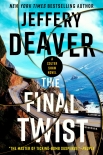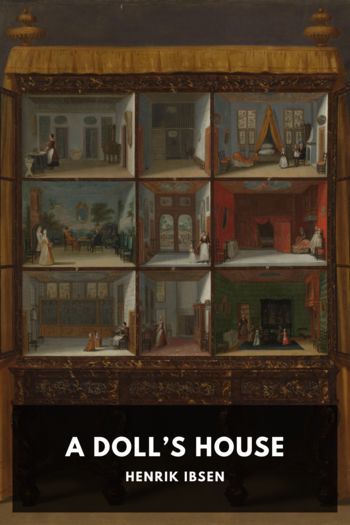The Final Twist by Jeffery Deaver (have you read this book .TXT) 📗

- Author: Jeffery Deaver
Book online «The Final Twist by Jeffery Deaver (have you read this book .TXT) 📗». Author Jeffery Deaver
Maybe Draco, the bartender, always a flirt, had been a little more generous than usual.
Was the drink count, possibly, 2.5 on the scale?
Careful, girl. You need to watch that.
As always, upon waking, the phone.
She turned toward the bedside table.
It wasn’t there.
No landline for her, her mobile was her only link at night. She always kept it near and charged. The umbilical, attached to the wall plug, was present, but no phone.
Jesus . . . What’s going on?
Then she saw the slippers. The pink fuzzy things were across the room, each on either side of, and facing, a small wooden chair. It had been scooted closer to the bed than she normally kept it. The slippers were facing the chair in a way that was almost eerily obscene—as if they’d been worn by somebody whose legs were spread and who was sitting on a lap.
“No,” Talese gasped, now spotting what was on the floor beside the chair: a plate with a half-eaten cookie on it.
Her heart thrummed fast; her breath grew shallow. Somebody’d been in the apartment last night! They’d rearranged her clothes, eaten the cookie.
Not six feet away from her!
The phone, the phone . . . where’s the goddamn phone?
Talese reached for the dress on the floor.
Then froze. Don’t! He—she figured the intruder would have been male—had touched it.
My God . . . She ran to her closet and pulled on jeans and an NYU sweatshirt, then stepped into the first pair of sneakers she found.
Out! Get out now! The neighbors, the police . . .
Fighting back tears from fright, she started out of the bedroom, then noticed that one of her dresser drawers was partially open. It was where she kept her underwear. She’d noted something boldly colorful inside.
She approached slowly, pulled it fully open and looked down. She gasped and finally the tears broke free.
On top of her panties was a page from a newspaper. It wasn’t one she read, so he would have brought it with him. Written on it, in lipstick—the shade that she favored, Fierce Pink—were three words:
Reckoning.
—The Locksmith
Annabelle Talese turned to sprint to the front door. She got about ten feet before she stopped fast.
She’d noticed three things:
One was that the butcher block knife holder, sitting on the island in the small kitchen, had a blank slot, the upper right-hand corner, where the largest blade had rested.
The second was that the closet in the hallway that led to the front door was open. Talese always kept it closed. There was an automated switch in the frame so that when you opened the door, the bulb inside went on. The closet now, however, was dark. She would have to walk past it to get to the front door.
The third thing was that the two deadbolts on the door were turned to the locked position.
Which meant—since the man who’d broken inside had no keys—he was still here.
2
The defense attorney, approaching the empty witness stand, beside which Lincoln Rhyme sat in his motorized wheelchair, said: “Mr. Rhyme, I’ll remind you that you’re still under oath.”
Rhyme frowned and looked over the solidly built, black-haired lawyer, whose last name was Coughlin. Rhyme affected a pensive expression. “I wasn’t aware that something might have happened to damage the oath.”
Did the judge offer a faint smile? Rhyme couldn’t see clearly. He was on the main floor of the courtroom, and the judge was considerably above and largely behind him.
The testimonial oath in court had always struck Rhyme as an unnecessary mouthful, even with the “so help you God” snipped off.
Do you solemnly swear to tell the truth, the whole truth and nothing but the truth?
Why did swearing have to be solemn? And once one affirmed the first “truth,” was there any point to the overkill? How about: “Do you swear you won’t lie? If you do, we’ll arrest you.”
More efficient.
He now relented. “I acknowledge that I’m under oath.”
The trial was being conducted in New York Supreme Court—which, despite the name, was in fact a lower-level court in the state. The room was wood paneled and scuffed, the walls hung with pictures of jurists from over the years, going back, it seemed, to the days of Reconstruction. The proceeding itself, however, was pure twenty-first century. On the prosecution and defense tables were computers and tablets—the judge had a slim high-def monitor too. There was not a single law book in the room.
Present were thirty or so spectators, most here to see the infamous defendant, though perhaps a few hoping to see Rhyme.
Coughlin, whose age Rhyme figured to be about fifty, said, “I’ll get to the substance of my cross-examination.” He flipped through notes. Maybe there were no books, but Rhyme noted easily a hundred pounds of foolscap between the defense and the prosecution tables.
“Thank you, sir,” said the judge.
Being a criminalist, a forensic scientist aiding in criminal investigation, is only partly about the laboratory; the other aspect of the job is performing. The prosecutor needs an expert witness to present findings in an articulate way and to patiently and effectively parry the defense counsel’s assault on your conclusions. On redirect, a good prosecutor can sometimes rehabilitate a witness battered by the defense, but it’s best not to get into hard straits in the first place. Lincoln Rhyme was reclusive by nature, and loved his time in a laboratory above all, but he was not entirely introverted. Who doesn’t enjoy a little grandstanding before the jury, and sparring with the defendant’s attorney?
“You testified on direct that no fingerprints of my client were left at the crime scene where Leon Murphy was murdered, correct?”
“No, I did not.”
Coughlin frowned, looking at a yellow pad that might have contained perceptive notes or might have contained doodles or a recipe for beef brisket. Rhyme happened to be hungry. It was ten a.m. and he’d missed breakfast.
Coughlin glanced at his client. Viktor Antony Buryak, fifty-two. Dark-haired like his mouthpiece but bulkier, with Slavic





Comments (0)